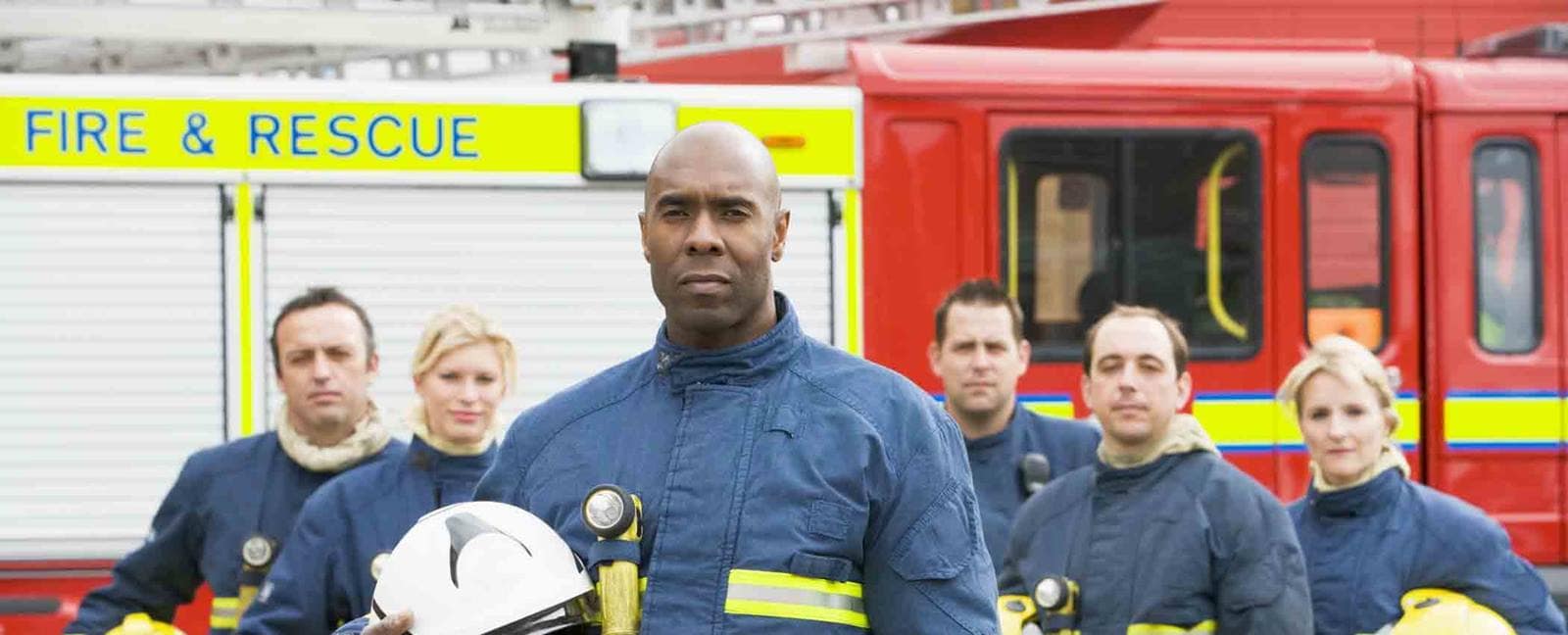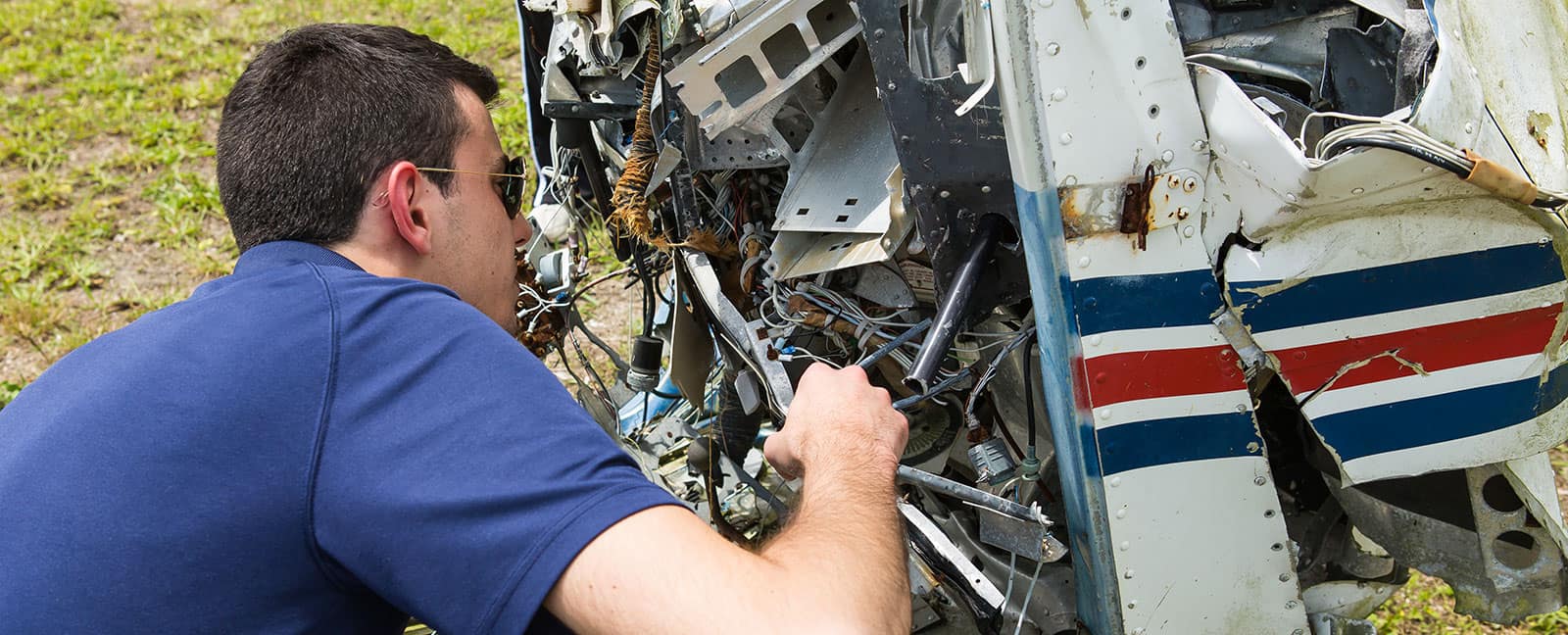
Bachelor of Science in
Emergency Services
Offering two specializations and encompassing all emergency service disciplines, this program is based on the National Fire Academy’s higher education curriculum.
The B.S. in Emergency Services degree program at Embry-Riddle is one of just a few university programs to carry the “Certificate of Recognition” from Fire Emergency Services Higher Education (FESHE). That means the curriculum addresses all critical areas that modern fire departments are tasked to perform.

Students can select from a specialization in Aviation Emergency Management or Fire & Emergency Services and learn from faculty members who have both academic backgrounds and proven expertise as emergency responders. Plus, when students complete courses through Embry-Riddle, they receive a National Fire Academy certificate just as if they completed the courses at the National Fire Academy.
As members of the Embry-Riddle network, students get the chance to collaborate with colleagues, leadership, and other professionals in their own organization’s communities while completing coursework.
Students can also take advantage of Embry-Riddle's partnerships with the Dallas/Fort Worth Fire Training Research Center (DFW FTRC) and the Aircraft Fire Fighting (ARFF) Working Group to develop and carry out research projects.
Concepts covered include human behavior, structures and systems, prevention, protection, investigation and analysis, organization and management, research, administration, hazardous materials, personnel management, political and legal foundations, terrorism, community risk reduction, disaster planning and control, system design for life safety, occupational safety, and human program management.
Students can strengthen their emergency management knowledge base by adding several minor courses of study based on the student’s specific area of interest.

The Bachelor of Science in Emergency Services has both International Fire Service Accreditation Congress accreditation and FESHE Recognition. Learn more about Embry-Riddle’s accreditation.
Accreditation Resources
Program Mission Statement
The mission of Embry-Riddle Aeronautical University's Bachelor of Science in Emergency Services (BSES) program is to educate and mentor students interested in Emergency Services. Students will gain a level of knowledge and experience required to be successful in the area of fire and emergency services. We will contribute to the emergency services epistemology through innovative research and partnerships. Our program will provide students with ethical and theoretical foundations for collaboration, leadership, and management within emergency services organizations. We will continue to modify and update with a balance between the principles, analytics, theory, technology, and practices associated with today's emergency service professionals. The curriculum will continually be based on the National Fire Academy Fire and Emergency Service Higher Education (FESHE) Module Curriculum Bachelors degree, to ensure quality course material that enable students to achieve program outcomes.
DETAILS
About Emergency Services at the Worldwide & Online Campus
The Bachelor of Science in Emergency Services degree broadly encompasses all emergency service response disciplines in public and private sectors including: fire, emergency medical, investigation, engineering, aircraft rescue and firefighting, environmental, hazmat, inspection, dispatch, security, OSHA, instruction, public information and wildland firefighting.
The curriculum design for this degree is based on in the National Fire Academy’s Fire and Emergency Services Higher Education (FESHE) Model Curriculum for a Bachelor’s Degree. Beyond the six FESHE core courses, several additional Embry-Riddle-developed courses have been approved for students to receive NFA certificates — this is a unique advantage of taking classes at Embry-Riddle.
Tracks/Specialties and/or Certificates
Students pursuing their Emergency Services degree can opt to complete courses for the following specializations:
- Aviation Emergency Management Specialization has a focus on aircraft accident investigation, airport emergency management, aviation safety, and leadership in emergency response organizations.
- Fire and Emergency Services Specialization focuses on emergency response administration, management, leadership, community risk reduction, and operational issues in emergency services.
Students pursuing their Emergency Services degree can opt to complete courses for the following certification:
- Students will earn the FEMA | Emergency Management Institute Professional Development Series (PDS) certificate as part of this program.
The Bachelor of Science in Emergency Services is 100 percent online — a perfect option for anyone juggling the demands of working full-time, shift work, and/or family life. With this flexible learning environment, Embry-Riddle encourages students to continue working throughout their studies.
This degree program participates in the Air University-Associate to Baccalaureate Cooperative (AU-ABC Category I). All students who have completed a Community College of the Air Force (CCAF) associates degree in Fire Science and Emergency Management are eligible. CCAF graduates can complete a Bachelor of Science in Interdisciplinary Studies by taking no more than 60 semester hours beyond their CCAF degree.
For students who choose to pursue their master’s degree, a 4+1 degree option is available.
In addition, the Industry Advisory Board for the Emergency Services degree program was formed as a method to ensure that program outcomes and objectives were relevant for graduates within the industry. Members of the board consist of many high ranking members of structural, ARFF, and wildland fire departments, emergency services and management areas, distinguished companies, and Federal, national, and volunteer organizations within the emergency services realm.
Student Learning Outcomes
Students will:
- Employ leadership and supervisory knowledge to effectively manage fire and emergency services incidents, resources, and programs.
- Apply research, critical thinking, and analytical decision-making skills to contemporary public safety challenges.
- Apply foundational fire and emergency services to scientific and technical concepts and principles.
- Implement management, protection, prevention, mitigation, response, recovery, and planning strategies responsive to community needs.
- Demonstrate proficiency in identifying and solving problems related to their specialty area using Fire Science knowledge and its interrelations with historical, organizational, legal, social, political, economic, and physical factors.
DEGREE REQUIREMENTS
General Education
| General Education | ||
| Embry-Riddle courses in the general education categories of Communication Theory and Skills, and Humanities and Social Sciences may be chosen from those listed below, assuming prerequisites are met. Courses from other institutions are acceptable if they fall into these broad categories and are at the level specified. | ||
| Communication Theory and Skills | 9 | |
| ENGL 123 | English Composition | 3 |
| ENGL (above ENGL 106) / SPCH / COMD (6) | 6 | |
| Humanities and Social Sciences | 12 | |
| Lower-Level Humanities | 3 | |
| Lower-Level Social Sciences | 3 | |
| Lower-Level or Upper-Level Humanities or Social Sciences | 3 | |
| Upper-Level Humanities or Social Sciences | 3 | |
| Any Physical and Life Sciences | 6 | |
| Any Mathematics 6-hour sequence above MATH 106 | 6 | |
| Any Computer Science / Information Technology | 3 | |
| Total Credits | 36 | |
Core/Major
| Program Support | 3 | |
| RSCH 202 | Introduction to Research Methods | 3 |
| Program Specialization | 39 | |
| Choose one Specialization | ||
Electives
| Open Electives** | 27 | |
- **
Students are allowed to utilize their elective credits to select any Minor (https://nextcatalog.erau.edu/worldwide/minors/), offered in the catalog.
| Specified Electives | 15 | |
| Choose 15 credits from ASCI/SFTY/ESVS/EMGY/SSES Courses | ||
| Total Degree Requirements | 120 | |
- *
Minnesota student residents refer to State of Minnesota Course Requirement statement for Humanities requirements.
Program Specializations:
Aviation Emergency Management Specialization
| ESVS 301 | Community Risk Reduction for the Fire and Emergency Services | 3 |
| ESVS 302 | Fire Dynamics | 3 |
| ESVS 303 | Fire Protection Structures and Systems | 3 |
| ESVS 305 | Fire Prevention Organization and Management | 3 |
| ESVS 400 | Analytical Approaches to Public Fire Protection | 3 |
| ESVS 401 | Applications of Fire Research | 3 |
| ESVS 404 | Managerial Issues in Hazardous Materials | 3 |
| EMGY 400 | Introduction to Incident Command System | 3 |
| ESVS 405 | Personnel Management for Fire and Emergency Services | 3 |
| ESVS 480 | Advanced Principles in Fire and Emergency Services Safety and Survival | 3 |
| BSAS 330 | Aircraft Accident Investigation | 3 |
| BSAS 350 | Aircraft Crash and Emergency Management | 3 |
| BSAS 409 | Aviation Safety | 3 |
| Total Credits | 39 | |
Fire and Emergency Services Specialization
| ESVS 201 | Fire-Related Human Behavior | 3 |
| ESVS 301 | Community Risk Reduction for the Fire and Emergency Services | 3 |
| ESVS 303 | Fire Protection Structures and Systems | 3 |
| ESVS 304 | Fire Investigation and Analysis | 3 |
| ESVS 305 | Fire Prevention Organization and Management | 3 |
| ESVS 400 | Analytical Approaches to Public Fire Protection | 3 |
| ESVS 401 | Applications of Fire Research | 3 |
| ESVS 402 | Fire and Emergency Services Administration | 3 |
| ESVS 404 | Managerial Issues in Hazardous Materials | 3 |
| EMGY 400 | Introduction to Incident Command System | 3 |
| ESVS 405 | Personnel Management for Fire and Emergency Services | 3 |
| ESVS 406 | Political and Legal Foundations of Fire Protection | 3 |
| ESVS 480 | Advanced Principles in Fire and Emergency Services Safety and Survival | 3 |
| Total Credits | 39 | |
Plan of Study (BSES)
Recommended plan of study and sequence of courses for a four-year degree and fall start completion scenario. A four-year degree plan or a particular starting term are not required but serve as an example.
Recommended Plan of Study for a Fall Start, Four-Year Degree Completion Scenario
B.S. in Emergency Services with Aviation Emergency Management Specialization
Year 1
| Term 1 | Credits | |
|---|---|---|
| ENGL 123 | English Composition | 3 |
| MATH Sequence 1 above MATH 106 | 3 | |
| Credits Subtotal | 6.0 | |
| Term 2 | ||
| ENGL/SPCH/COMD Elective | 3 | |
| MATH Sequence 2 above MATH 106 | 3 | |
| Credits Subtotal | 6.0 | |
| Term 3 | ||
| Computer Science/Information Technology | 3 | |
| Open Elective: Statistics | 3 | |
| Credits Subtotal | 6.0 | |
| Term 4 | ||
| ENGL/SPCH/COMD Elective | 3 | |
| RSCH 202 | Introduction to Research Methods | 3 |
| Credits Subtotal | 6.0 | |
| Term 5 | ||
| Physical & Life Science | 3 | |
| Open Elective | 3 | |
| Credits Subtotal | 6.0 | |
| Credits Total: | 30.0 | |
Year 2
| Term 1 | Credits | |
|---|---|---|
| ESVS 301 | Community Risk Reduction for the Fire and Emergency Services | 3 |
| Lower-Level Humanities | 3 | |
| Credits Subtotal | 6.0 | |
| Term 2 | ||
| ESVS 302 | Fire Dynamics | 3 |
| Lower-Level Social Science | 3 | |
| Credits Subtotal | 6.0 | |
| Term 3 | ||
| ESVS 303 | Fire Protection Structures and Systems | 3 |
| Physical & Life Science | 3 | |
| Credits Subtotal | 6.0 | |
| Term 4 | ||
| ESVS 404 | Managerial Issues in Hazardous Materials | 3 |
| Upper-Level Humanities or Social Science | 3 | |
| Credits Subtotal | 6.0 | |
| Term 5 | ||
| ESVS 405 | Personnel Management for Fire and Emergency Services | 3 |
| Any Level Humanities or Social Science | 3 | |
| Credits Subtotal | 6.0 | |
| Credits Total: | 30.0 | |
Year 3
| Term 1 | Credits | |
|---|---|---|
| ESVS 305 | Fire Prevention Organization and Management | 3 |
| Open Elective | 3 | |
| Credits Subtotal | 6.0 | |
| Term 2 | ||
| ESVS 400 | Analytical Approaches to Public Fire Protection | 3 |
| Open Elective | 3 | |
| Credits Subtotal | 6.0 | |
| Term 3 | ||
| BSAS 330 | Aircraft Accident Investigation | 3 |
| Open Elective | 3 | |
| Credits Subtotal | 6.0 | |
| Term 4 | ||
| BSAS 409 | Aviation Safety | 3 |
| Open Elective | 3 | |
| Credits Subtotal | 6.0 | |
| Term 5 | ||
| BSAS 350 | Aircraft Crash and Emergency Management | 3 |
| Open Elective | 3 | |
| Credits Subtotal | 6.0 | |
| Credits Total: | 30.0 | |
Year 4
| Term 1 | Credits | |
|---|---|---|
| ESVS 401 | Applications of Fire Research | 3 |
| Open Elective | 3 | |
| Credits Subtotal | 6.0 | |
| Term 2 | ||
| EMGY 400 | Introduction to Incident Command System | 3 |
| Specified Elective | 3 | |
| Credits Subtotal | 6.0 | |
| Term 3 | ||
| ESVS 480 | Advanced Principles in Fire and Emergency Services Safety and Survival | 3 |
| Specified Elective | 3 | |
| Credits Subtotal | 6.0 | |
| Term 4 | ||
| Open Elective | 3 | |
| Specified Elective | 3 | |
| Credits Subtotal | 6.0 | |
| Term 5 | ||
| Specified Elective | 3 | |
| Specified Elective | 3 | |
| Credits Subtotal | 6.0 | |
| Credits Total: | 30.0 | |
| Total Degree Requirements | 120 | |
B.S. in Emergency Services with Fire & Emergency Services Specialization
Year 1
| Term 1 | Credits | |
|---|---|---|
| ENGL 123 | English Composition | 3 |
| MATH Sequence 1 above MATH 106 | 3 | |
| Credits Subtotal | 6.0 | |
| Term 2 | ||
| ENGL/SPCH/COMD Elective | 3 | |
| MATH Sequence 2 above MATH 106 | 3 | |
| Credits Subtotal | 6.0 | |
| Term 3 | ||
| Computer Science/Information Technology | 3 | |
| Open Elective: Statistics | 3 | |
| Credits Subtotal | 6.0 | |
| Term 4 | ||
| ENGL/SPCH/COMD Elective | 3 | |
| RSCH 202 | Introduction to Research Methods | 3 |
| Credits Subtotal | 6.0 | |
| Term 5 | ||
| Physical & Life Science | 3 | |
| Open Elective | 3 | |
| Credits Subtotal | 6.0 | |
| Credits Total: | 30.0 | |
Year 2
| Term 1 | Credits | |
|---|---|---|
| ESVS 301 | Community Risk Reduction for the Fire and Emergency Services | 3 |
| Lower-Level Humanities | 3 | |
| Credits Subtotal | 6.0 | |
| Term 2 | ||
| ESVS 201 | Fire-Related Human Behavior | 3 |
| Lower-Level Social Science | 3 | |
| Credits Subtotal | 6.0 | |
| Term 3 | ||
| ESVS 303 | Fire Protection Structures and Systems | 3 |
| Physical & Life Science | 3 | |
| Credits Subtotal | 6.0 | |
| Term 4 | ||
| ESVS 404 | Managerial Issues in Hazardous Materials | 3 |
| Upper-Level Humanities or Social Science | 3 | |
| Credits Subtotal | 6.0 | |
| Term 5 | ||
| ESVS 405 | Personnel Management for Fire and Emergency Services | 3 |
| Any Level Humanities or Social Science | 3 | |
| Credits Subtotal | 6.0 | |
| Credits Total: | 30.0 | |
Year 3
| Term 1 | Credits | |
|---|---|---|
| ESVS 305 | Fire Prevention Organization and Management | 3 |
| Open Elective | 3 | |
| Credits Subtotal | 6.0 | |
| Term 2 | ||
| ESVS 400 | Analytical Approaches to Public Fire Protection | 3 |
| Open Elective | 3 | |
| Credits Subtotal | 6.0 | |
| Term 3 | ||
| ESVS 304 | Fire Investigation and Analysis | 3 |
| Open Elective | 3 | |
| Credits Subtotal | 6.0 | |
| Term 4 | ||
| ESVS 406 | Political and Legal Foundations of Fire Protection | 3 |
| Open Elective | 3 | |
| Credits Subtotal | 6.0 | |
| Term 5 | ||
| Open Elective | 3 | |
| Open Elective | 3 | |
| Credits Subtotal | 6.0 | |
| Credits Total: | 30.0 | |
Year 4
| Term 1 | Credits | |
|---|---|---|
| ESVS 401 | Applications of Fire Research | 3 |
| Open Elective | 3 | |
| Credits Subtotal | 6.0 | |
| Term 2 | ||
| EMGY 400 | Introduction to Incident Command System | 3 |
| Specified Elective | 3 | |
| Credits Subtotal | 6.0 | |
| Term 3 | ||
| ESVS 402 | Fire and Emergency Services Administration | 3 |
| ESVS 480 | Advanced Principles in Fire and Emergency Services Safety and Survival | 3 |
| Credits Subtotal | 6.0 | |
| Term 4 | ||
| Specified Elective | 3 | |
| Specified Elective | 3 | |
| Credits Subtotal | 6.0 | |
| Term 5 | ||
| Specified Elective | 3 | |
| Specified Elective | 3 | |
| Credits Subtotal | 6.0 | |
| Credits Total: | 30.0 | |
| Total Degree Requirements | 120 | |
B.S. in Emergency Services to M.S. in Emergency Services
The BSES to MSES program is for exceptional students who are committed to continuing their education through the Master of Science in Emergency Service (MSES) degree. The MSES degree program is designed for individuals seeking advanced knowledge in planning, emergency services, hazard mitigation and preparedness, disaster response, recovery, and homeland security. The program accelerates the completion of the MSES degree by allowing qualified BSES students to complete up to three MSES graduate courses and count them toward both degrees.
Students may begin to complete the requirements when they have achieved senior status (having earned at least 75 credit hours with a 3.00 CGPA). Students must earn a B grade or better in each of the three MSES courses. If a grade of C, D, or F is earned in any of the MSES graduate courses taken for BSES credit, the student will be removed from the program, have credit awarded to the BSES degree only, and may continue to complete the BSES degree. Additionally, students must complete a minimum of 120 course credits for their Bachelor of Science degree.
Upon completion of the BSES degree, students will be enrolled in the MSES program where they can continue completing the degree requirements with the previous MSES courses already credited.
Students interested in this accelerated program option should contact their Academic Advisor or Campus Advisor.
Get Started Now:
Summary
120 Credits
Estimate your tuition by using the Tuition Calculator
View Financial Aid Information
Learn more about the benefits of an Online Degree
Learn about our General Education
Find out about transferring credits to this degree
Learn more about our Veterans & Military benefits
View our Academic Calendar
Search Courses for this degree



